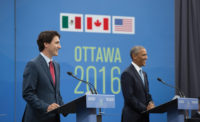The long trade battle over Canadian softwood lumber exports to the U.S. seems to be heading for another critical point. With the Oct. 12 expiration of the two countries’ one-year moratorium on launching formal lumber trade actions against each other, a U.S. industry lumber group has threatened to file a complaint against Canada.
Although the yearlong “standstill” period is over , the U.S. and Canada are continuing their long-running negotiations aimed at a new pact governing Canada’s softwood lumber exports, the countries’ leading trade officials say. Softwood lumber is a key material in residential construction.
The moratorium followed nine years under a bilateral softwood lumber trade agreement and extension.
U.S. Trade Representative Michael Froman and Canadian Minister of International Trade Chrystia Freeland said in an Oct. 12 joint statement, “The United States and Canadian governments are committed to continuing negotiations in an effort to achieve a durable and equitable solution for North American softwood lumber producers, downstream industries, and consumers.”
They noted that, during a meeting in June, President Obama and Canadian Prime Minister Justin Trudeau had instructed their negotiators to reach a deal that would “maintain Canadian exports at or below an agreed upon U.S. market share to be negotiated, with the stability, consistency and flexibility necessary to achieve the confidence of both industries.”
The National Association of Home Builders said earlier this year that Canadian lumber has about 28% of the U.S. market.
The U.S. Lumber Coalition, which contends that Canada has unfairly subsidized its lumber sales to the U.S, said in an Oct. 12 statement that it supports a new pact that follows Obama’s and Trudeau’s joint goal. But the Washington, D.C.-based coalition added that with no deal achieved by the end of the moratorium period, “the coalition has no choice but to move to initiate trade cases against unfairly traded imports from Canada at the most effective time.”
Susan Yerkovich, president of the Vancouver-based BC Lumber Trade Council, said in an Oct. 12 statement that the group “will continue to support work towards achieving a negotiated resolution to this dispute.”
She added, “However, we are also fully prepared and working alongside the Canadian government to defend the industry against any potential trade actions brought by the United States, as we have done successfully in the past.”
Softwood lumber has long been the center of a dispute between the U.S. and Canada. In 2006, they signed a six-year agreement dealing with pricing and export volumes of Canadian lumber. In 2012, the countries extended that pact to October 2015. The one-year standstill period followed.
Talks aimed at producing a successor agreement appeared to get more serious earlier this year. Froman and Freeland said in mid-June that the two sides had held “100 days of intensive engagement” and made “significant advances in exploring the key issues and priorities,” but had struck no deal yet.
The meeting between Obama and Trudeau later in June in Ottawa produced the two leaders’ charge to their negotiators to hammer out a new lumber pact.
Canadian softwood lumber exports to the U.S. were about $4.6 billion in U.S. dollars in 2015, up 7% from 2014, according to Statistics Canada.
Froman and Freeland said the two sides will continue to meet this week in Washington, D.C.






